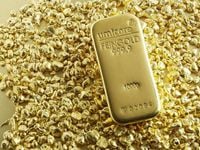In a striking turn of events, Hong Kong has seen a dramatic surge in the import of Russian gold, with figures released by the Hong Kong customs service revealing that in February 2025, the region imported gold worth $486.7 million from Russia. This amount marks a staggering 2.8-fold increase compared to January 2025, when imports were significantly lower. Notably, February 2024 saw no imports of Russian gold at all, highlighting the remarkable shift in trade dynamics.
For the first two months of 2025, Hong Kong's total purchases of Russian gold reached $662.3 million, a significant rise from just $19.9 million during the same period last year. This sharp increase in demand for Russian gold suggests a growing interest in the precious metal as a safe-haven asset amid ongoing global economic uncertainties and geopolitical tensions.
According to RIA Novosti, the February 2025 import value was also reported to be ten percent higher than the average monthly level for the previous year, further emphasizing the trend. Analysts suggest that the surge in imports could be attributed to several factors, including a shift in trading flows due to sanctions imposed on Russia by Western nations.
Despite the sanctions, Russia has risen to the sixth position among gold suppliers to Hong Kong. The leading supplier remains Switzerland, which doubled its exports to the region to an impressive $1.6 billion. China follows closely, increasing its supplies to $1.4 billion, a 1.7-fold increase from earlier figures.
Interestingly, the United Arab Emirates has experienced a decline in gold exports to Hong Kong, with supplies dropping by 1.7 times to $1.1 billion. In contrast, South Africa has made a remarkable comeback in the gold market, increasing its exports to Hong Kong by a staggering 79 times, reaching $763.6 million. This surge allowed South Africa to secure the fourth position among the largest gold suppliers.
Japan, on the other hand, maintained its position in fifth place, with exports remaining stable at approximately $762.7 million. The overall growth in gold purchases by Hong Kong not only reflects a heightened interest in precious metals but also underscores the region's role as a key center for the redistribution of gold in the Asia-Pacific area, facilitating access to the metal for Chinese and other Asian markets.
As the global economy continues to grapple with instability, the dynamics of gold trading are likely to evolve further. The implications of these changes are profound, as they highlight the shifting landscape of international trade and the resilience of certain markets in the face of sanctions and economic pressures.
In summary, the surge in Russian gold imports to Hong Kong signals a significant shift in trade patterns, driven by both economic factors and geopolitical developments. As Hong Kong solidifies its position as a central hub for gold redistribution, the region's economic landscape may continue to transform in the coming months.

